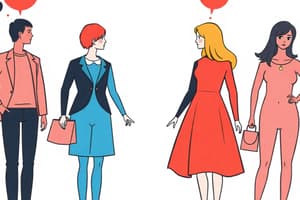Podcast
Questions and Answers
What is the definition of gender?
What is the definition of gender?
Characteristics of women, men, girls, and boys that are socially constructed.
What role does religion play in society?
What role does religion play in society?
Shaping cultural, social, and personal identity.
Which class involves people who have great wealth and sources of income?
Which class involves people who have great wealth and sources of income?
- Upper Class (correct)
- Lower Class
- Middle Class
What are two categories of the lower class?
What are two categories of the lower class?
What does nationality refer to?
What does nationality refer to?
What is a common characteristic of students with exceptionalities?
What is a common characteristic of students with exceptionalities?
Which category includes students who may require individualized instruction?
Which category includes students who may require individualized instruction?
Students with speech or language impairments may require what type of support?
Students with speech or language impairments may require what type of support?
What supports do students with auditory disabilities often need?
What supports do students with auditory disabilities often need?
What is an example of a condition in students with orthopedic disabilities?
What is an example of a condition in students with orthopedic disabilities?
What is true for students with multiple exceptionalities?
What is true for students with multiple exceptionalities?
Study Notes
Gender
- Characteristics of women, men, girls, and boys are social constructs.
- Variability across societies and over time in understanding and defining gender.
- Gender shapes social organization and influences roles and expectations.
Religion
- Set of beliefs, practices, and rituals centered around deities.
- Often includes ethical and moral principles guiding behavior.
- Significant impact on shaping cultural, social, and personal identity worldwide.
Socio-Economic Status
- Varies among students in classrooms, influencing educational experiences.
- Class distinctions include upper class, middle class, and lower class.
Upper Class
- Composed of individuals with substantial wealth and income sources.
- Represents the elite in society with significant power and prestige.
Middle Class
- Divided into upper middle class (e.g., businessmen, professionals) and lower middle class (e.g., teachers, clerks).
- Generally associated with stability and access to resources.
Lower Class
- Positioned at the bottom of the socio-economic ladder, categorized into upper-lower and lower-lower class.
- Upper-lower class includes working individuals; lower-lower class includes unemployed or dependent on aid.
Nationality
- Status of belonging to a particular nation, often tied to citizenship.
Ethnicity
- Pertains to a person’s ethnic traits, classifications, or associations determined by cultural factors.
Exceptionality
- Refers to students with special needs, categorized into six areas of exceptionalities.
Intellectual Exceptionalities
- Includes students with superior intelligence (gifted) and those who are slow learners.
- Gifted students require advanced coursework; slow learners benefit from individualized support.
Communicative Exceptionalities
- Involves learning disabilities and speech or language impairments.
- Students with dyslexia need adapted reading materials; those with speech issues may require therapy.
Sensory Exceptionalities
- Comprises auditory or visual disabilities.
- Deaf students may use hearing aids or ASL; visually impaired students may need braille or screen readers.
Behavioral Exceptionalities
- Includes emotionally disturbed or socially maladjusted students.
- Support strategies might involve counseling and individual behavior plans.
Physical Exceptionalities
- Covers students with orthopedic or mobility disabilities.
- Schools must provide accessible environments and necessary mobility aids.
Multiple Exceptionalities
- Students with combinations of conditions require comprehensive support.
- Tailored approaches needed to address diverse needs effectively.
Studying That Suits You
Use AI to generate personalized quizzes and flashcards to suit your learning preferences.
Description
This quiz explores the social constructs of gender and their variations across different cultures and time periods. It also delves into the interplay between gender, society, and politics, examining how these elements influence each other. Gain a deeper understanding of the complexities surrounding gender roles and their significance in social organization.



